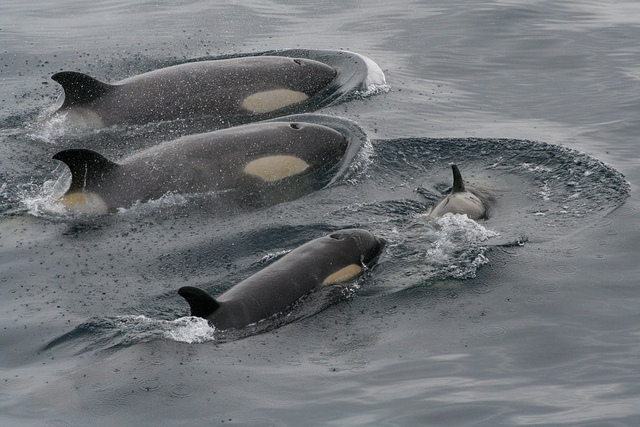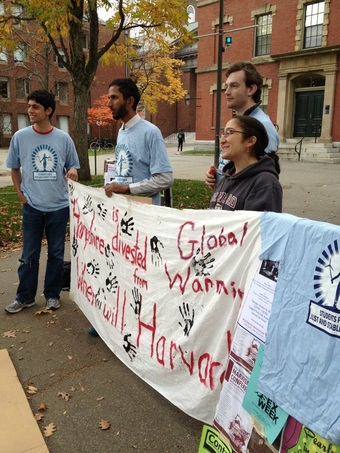|
I'm pretty excited about the two new articles that I wrote for The International. The first concerns the Kendall Jones controversy. This article is predominantly concerned with the use of hunting permits as a conservation tool. The second concerns the integration of humanitarian efforts with conservation efforts. They both center around key debates in conservation biology: the role of hunting permits and the purpose of conservation biology. (Please note that the site is currently being rebuilt and rebranded as "The Record" so the links may not be working right at this second)
Kendall Jones Truthfully hunting permits have long been used to fund conservation in the North America. This is to some can be a hard to swallow policy. If your a hunter or your politics predispose you to favor hunters, then you have little trouble with this. If your a animal rights activist, you likely find this practice abhorrent. Truth be told I'm fine with it as long as it is tightly regulated. There are plenty of folks who hunt for the dinner table and not the wall. Before anyone gets angry about the phrase regulated I should clarify. I simply mean that populations be managed to prevent a species from going extinct or being in danger of going extinct. No different then what we do with fisheries. Sustainable harvests. In fact, there is a serious ecological problem that could be solved with hunting. Largely due to a half century long campaign of targeted destruction against native predator populations (most notably wolves) by the US government in the 20th and late 19th centuries, deer numbers are out of control. In much of the eastern United States and the Midwest there is little to control deer populations. As wolf populations recover and spread out (and there is no guarantee they will make it to many areas where deer are common), this issue should lessen. In the meantime however, hunters are a valuable asset for keeping such populations in check. That said, I have trouble stomaching permits for endangered species. Functionally, as long as it is closely monitored and transparent, if done correctly this could be a lucrative and effective practice for conservation. As long as the targets are well beyond breeding age and not likely to contribute meaningfully to species survival, their death while sad can serve a greater purpose. The key to this however is that it is closely monitored. Wide corruption of this process in the number of permits granted could derail conservation programs. For that reason I am incredibly nervous about any such program. In addition with some rare populations, a stray bullet killing a breeding member of the population could have dramatic impacts on population viability and in turn species survival. Where I think the rational middle ground for this issue is in regards to tranquilization. There are medical procedures that could be done on many of the bigger endangered species that hunters would desire to hunt and conservationists are trying to save. By working together, this could be an effective relationship. Telos of Conservation Biology Telos for those not up on their greek means purpose, and is used in philosophical discussions. Thus ends my intellectual snobbery for this post. Conservation biology has the purpose of protecting biodiversity. There is a big debate about whether humanitarian goals should be integrated into conservation biology. Truthfully, I think this debate is a little silly. You cannot ignore social-economic realities of an area in which you wish to preserve biodiversity. These social-economic realities may be (and likely are) major drivers in the lives of whatever species/ecosystem you are attempting to protect. In addition ecosystem services mean something to the business community and policymakers. I consider myself in this silly debate a biocentric. My purpose for working in conservation biology is largely based on my own morality. I do my work largely to protect biodiversity to the best of my ability. To me slowing the worldwide extinction rate is my top professional priority. I'm also a realist. If I can save a rainforest by developing a community conservation project that empowers the local populace and gives them another avenue of revenue, I'm sure as hell going to do it. Humanitarian goals are not a bad thing. If you can combine them with conservation goals, that is fantastic. More than that, the needs of the general populace need consideration. To ignore that when considering massive conservation projects at this stage the game is a bad idea.
0 Comments
I cannot tell what you are thinking. I can predict, but I do not know what is going on behind your eyes as you read this post. I can’t figure that out any more then when I look into the eyes of my Siberian husky. For people unfamiliar with huskies, they are a breed that is quite independent. If a golden retriever lives to serve, then a husky has its own list of priorities and hopefully can fit you in on Tuesday. While they can be loving and affectionate, they are their own animal. Kodiak is sometimes more roommate than pet. Still when he runs over with his tail waiving, an excited look in his eyes, and unloads a series of kisses after I come home from grad school for a few days, it is very hard not to check my formal training at the door. In my undergraduate classes I was taught that we are not to assume animals are capable of emotion. Nor are we to attribute behavior to emotion. To consider emotion in an animal was to anthropomorphize it. That is, it was to project human attributes on non-human entities. Disney does this all the time for story telling purposes. There are epistemological reasons for this. Truth be told it is a rational approach until we begin to consider evolution. Evolution as a mechanism is inherently conservative. Not conservative in that it is for supply side economics, but conservative in that the evolutionary process only builds upon what is already there. My offspring will not suddenly have compound eyes identical in structure to that of a fly unless the genetic code for that trait is either already there (which I would highly doubt) or generated through mutation. So the question is: are human emotions unique to humans or are they something we inherited. It is my opinion that evidence is with the later. Chimpanzees demonstrate complex behaviors including: social-political hierarchies (hierarchies are not merely based on size but in group politics plays a role), use of tools, and high level problem solving in comparison to other species. They are our closest living relatives and for all intents and purposes demonstrate cognitive abilities on par with young children. Gorillas have been taught sign language. Primates demonstrate behaviors that appear to clearly be linked to emotional reactions. Fear is probably the easiest to recognize. Still you might suggest that maybe our emotional intelligence is simply an attribute unique to primates. For those who caught the painfully depressing documentaries "Blackfish" and "Luna", the documentarians did a decent job explaining whale social groups. I watched sections where they explained whale behavior with a critical eye. I was a marine biologist for two years and had the awesome opportunity to study whales. (Side note: please if you get the chance donate to the Blue Ocean Society for Marine Conservation) When discussing the plight of separating wild orcas from their families they pointed out something interesting that I went back and verified. The part of the Orca brain that handles social and emotional intelligence is potentially more developed in orcas than humans. In fact their brains demonstrate the kind of complexity we typically see in intelligent primates.
So what does this mean? It means first off that the question of emotions at least in mammals, appears to be settled. We see behaviors and the kind of brain development that would indicate emotions. We even appear to have documented cases of dolphins committing suicide. So the case for human or even primate exceptionalism in this area appears to be bunk. So how emotions are considered in animal behavior going forward should take into consideration how developed the brain in the animal in question is. This also has policy implications. Dolphins are officially considered non-human persons under Indian law. In fact the legal personhood movement has gained steam. As it continues to gain steam, personhood will have economic impacts. If I kill a dolphin with a fishing net I also net a manslaughter charge, it will create a need for innovation in fishing technologies and fisherman behavior. Without fail there will be people who decry such pressures on economic forces. In fact if history is any indicator, we could see the Heartland Institute, American Enterprise Institute, and Cato all paid to coauthor a document claiming that dolphins are incapable of feeling emotion and like being killed with fishing nets. The disgusting level of corruption in the think tank world aside, we have to consider the moral implications of scientific discoveries. If orcas, chimpanzees, and Kodiak are all rational actors capable of emotions, have their own wants and needs, and forge deep social connections than maybe the animal rights movement has a point to make. I was drawn to biology from a young age. There was a time not too long ago that Animal Planet and Discovery Channel didn’t have any reality television. In fact they were predominantly science channels. Animal Planet was full of nature documentaries. Sure they ranged in educational value, but they were none fascinating for a child and a teenager to watch. I had the strong initial interest in dinosaurs that most children go through, and mine has lasted to this day. When I realized I didn’t want to be veterinarian as an undergraduate, ecology made the most sense to me. Both out of sheer interest and because I wanted to work on important problems. To me this logically meant working on the environment, because you would be hard pressed to find bigger or more serious issues than there.
When you look at environmental problems, they are sometimes difficult to classify. Is protecting the rain forest while simultaneously insuring that local human populations are treated humanely an issue of land use practices, humanitarianism, or both? (I tend to favor both) In no place is this classification issue more evident than with climate change. Climate change is the mother of all environmental issues. You would be hard pressed not to find an issue that it doesn’t exacerbate, or doesn’t worsen it. Whether its pollution of the atmosphere through CO2 release, loss of sequestration opportunities through forest habitat loss, or undermining conservation biology it is prevalent in the environmental sciences. As such I was drawn to it, because if you can solve it you can simultaneously protect so many other different things. Climate change will drastically impact the biosphere, and humans are part of that. More than that it has already impacted me with my lifetime, and will have consequences for my family in the future. I have already begun to put consideration into where I will ultimately settle down based on climate change impacts. One of the most important ways to fight it is to protect ecosystems like forests from being destroyed, and in turn lose important allies to stabilize atmospheric carbon. These systems also help to decrease the severity of the current extinction, which I suppose after spending so many years interested in dinosaurs matters a lot to me. This post was inspired by a memory. I was working on the book and I was reminded of a conversation I had with a very close cousin a few years ago. I was asked why I even bothered since the odds seem so against any action climate change. While I don’t remember the exact answer at the time, as someone raised as a fighter I have an answer I’m comfortable with giving now. When I think about the impacts climate change will on worldwide biodiversity and the livability of different regions of the planet, my answer to that question is this: "I do it because if I fail, I need to be able to look my children in the eye and say that I fought as hard as I possibly could to stop it." I am very excited to announce I'm planning on releasing a book. After toying around with ideas for a long time, I decided to finally take the plunge and do a self published book. I figured it would be a good call to self publish my first time around, and then if I want to take the plunge again go through more traditional channels. The working title for the book is Polar Bears, Politics, and Things People are Wrong About on the Internet. It will deal with the interface of major environmental issues and politics. More updates as the project continues.
|
AuthorChristopher Round is a doctoral candidate at George Mason University studying information technology and climate policy. Archives
July 2019
Categories |





 RSS Feed
RSS Feed
